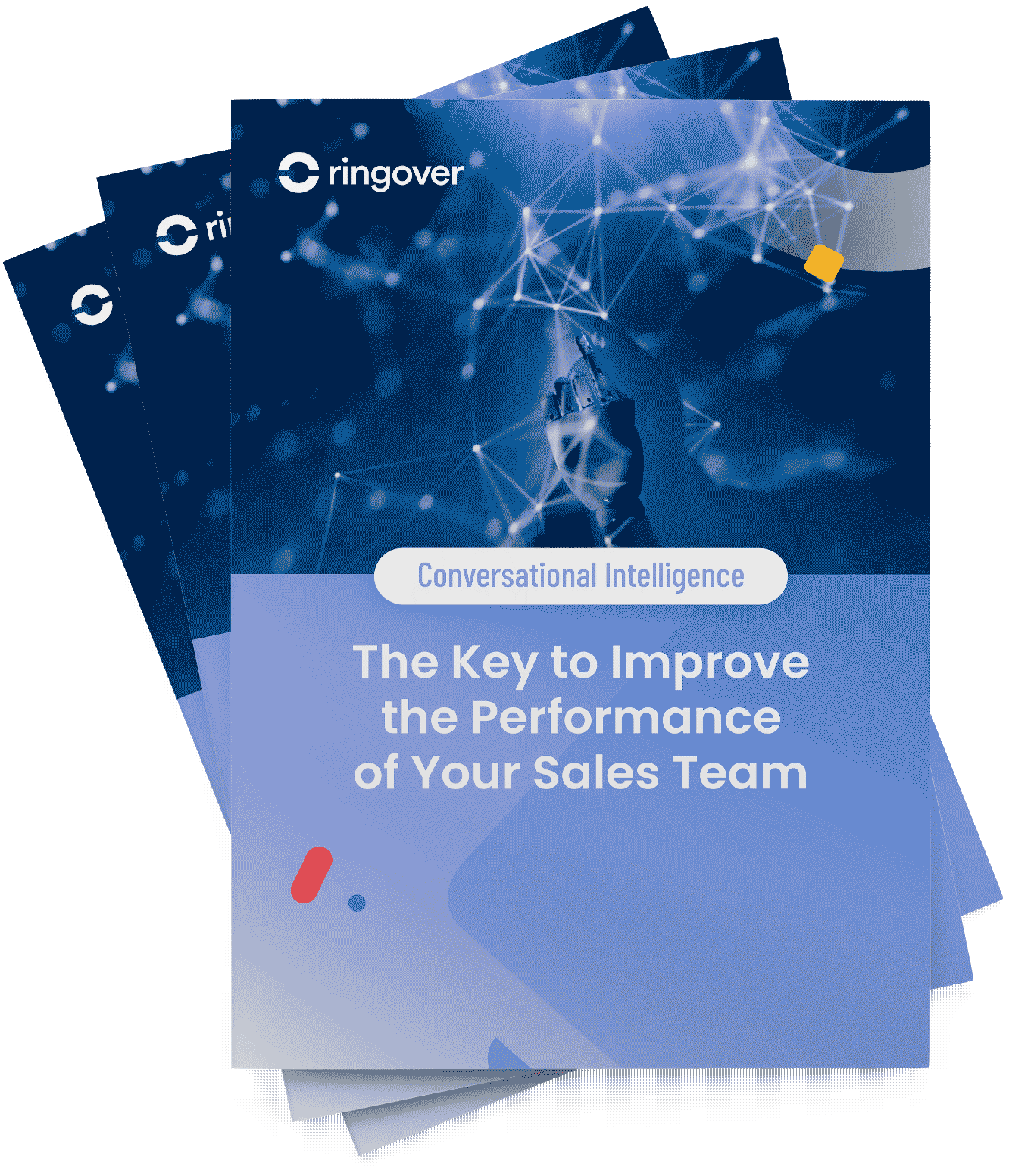Summary
Regardless of the industry you work in and the job you do, AI's rapid progression means that it will likely be able to impact the tasks you perform on some level. Whether performing routine tasks like organizing data or writing emails, it is becoming increasingly important for professionals to understand AI and how it can improve their productivity.
If as many as 60% of all jobs globally will be impacted by AI and machine learning in future, hiring managers around the world will be on the lookout for candidates with experience in using AI technology.
Considering the jobs most likely to use–or even be replaced by–AI now or in the near future, Ringover has analyzed 100,000 job ads to find out which roles already are most likely to require AI experience, and which areas within the U.S. are furthest ahead in the AI hiring race.
Key findings
- One in 25 U.S. jobs analyzed (4.1%) now require a candidate to have experience using AI or machine learning tools.
- Software engineers are most in need of AI experience, with three-quarters of roles (76.3%) mentioning it in their job ads
- Almost eight in 10 roles that require AI experience (78.6%) are fully remote.
- More than four in 10 jobs analyzed (40.9%) requiring AI skills are entry-level.
- On average, candidates with AI skills can earn $24,268 more than those without for the same job.
- Washington has the highest proportion of AI-skilled jobs (8.5%) of any U.S. state.
One in 25 U.S. jobs now require experience of using AI
Overall, we found that more than one in 25 jobs analyzed in the U.S. (4.1%) require AI and/or machine learning (ML) experience. However, around one in five American workers (19%) are in jobs that are exposed to AI technology on a daily basis, according to the Pew Research Center.
It seems that in 2024, your likelihood of needing AI experience to land a job will depend on your location. Based on our analysis of job roles, we found that Washington has the highest concentration of AI and ML positions (8.5%) of any U.S. state. With tech giants Microsoft and Amazon both located within the Seattle metropolitan area, Washington looks set to be an AI powerhouse economy for years to come.

Elsewhere in the top 10, the DC area appears to have a high concentration of AI-skilled jobs. Both Virginia (7.7% of AI & ML jobs) and the District of Columbia itself (6.7%) both outperform the likes of Massachusetts and New York — states with established tech clusters.
A study by the University of Maryland, which tracks the intensity of hiring over the last 12 months, found that companies in both DC and Virginia are employing people with AI skills at a faster rate than in California. Federal agencies in the DC area have stepped up their search for AI-savvy talent in 2024, and the White House itself pledged to hire 100 new AI-driven jobs.
Software Engineers most in need of AI experience
It is clear that AI is transforming the world of work, but any software engineer will know that it has become a vital tool in their day-to-day operations. Of the roles we analyzed, the highest percentage of jobs that needed AI experience was for graphic design (94.5%). Generative AI tools like Midjourney and Adobe's Firefly have made it easier to create graphics and artwork from prompts.
With generative AI for the design sector expected to increase its global market size to $7.75 billion by 2032, many in the industry fear that technological advancements will eventually replace humans. However, Ashley Still, Adobe's senior vice president of digital media, argues that AI will complement graphic designers in the way digital cameras aid professional photographers' work.
-2d3f5.png)
Our research also shows that software engineer is the most common profession for AI-skilled jobs. We found that AI skills were needed in 744 roles, almost double that of other professions like data analysts and copywriters. Programs like ChatGPT and Github Copilot have simplified coding for developers of all levels, shortening the time spent on individual tickets.
Gartner estimates that three-quarters (75%) of commercial software developers will use AI code assistants by 2028, with almost two-thirds (63%) of organizations currently piloting some form of code automation. While tools like Devin AI threaten to replace software engineers fully, the evidence suggests that technology will support and not replace developers.
Eight in 10 AI-driven roles are remote
While AI is revolutionizing industries like software engineering and graphic design, a wider transformation is happening around working practices. Remote work has become more commonplace since the Covid-19 pandemic, with a third of the U.S. workforce (35%) now in permanently remote roles.
While many organizations are shifting their focus toward return-to-office policies, AI has the potential to alter remote work rapidly.
Academics are divided on whether AI is beneficial for remote work. Professors at Oxford University suggest that remote jobs will be automated first as a result of advances in generative AI, McKinsey research suggests that more than half of AI-related vacancies in STEM were struggling to be filled due to skills shortages in 2023. This is an opportunity for skilled, remote-based professionals with AI skills to tackle a crucial gap in the labor market.

Our research appears to support this, as almost eight in 10 roles (78.6%) we analyzed that required AI knowledge were fully remote. While more than two-thirds of jobs (68.3%) are for full-time candidates, just 4.2% of positions require a candidate to be on-site for all of the working week.
Four in 10 AI-skilled roles are entry-level
More than four in 10 job roles (40.9%) that specify a need for AI knowledge are entry-level. As young people enter the workforce, it is crucial that they develop an understanding of AI tools as they emerge to support their job performance day-to-day. A report by the British Council found that 65% of today's students will one day be employed in roles that do not exist yet.

Interestingly, we can see that roles with more career experience require fewer AI skills. Just 1.6% of director roles and 0.2% of executive positions require AI skills. While junior positions are becoming more exposed to AI technology, we are still yet to see the same transformation in the boardroom.
Ryan McCarthy, Board Leadership Centre Lead at KPMG, argues, “Based on the hype around AI, you would imagine there would be moments where someone has come into the boardroom and said ‘we have a new emerging threat and it's this specific thing'. I haven't really seen it in those terms. The discussions so far seem to have been at surface level.”
AI-trained professionals can earn $24k more than those without
As AI tools become more prevalent in the workplace, evidence suggests that technology will complement, not replace skilled workers. Whether you're just joining the workforce or working your way up the ladder, learning how AI can support your role and development will benefit your career and leave you less exposed to automation.
Initiatives like the World Economic Forum's Reskilling Revolution aim to transform skills training and prepare the global workforce for the jobs of tomorrow; it estimates that $8.3 trillion can be added to global GDP by 2030 with accelerated progress on upskilling global workers.

One clear initiative to skills training is higher pay, and when it comes to AI, our research suggests that skilled workers can earn an average of $24,268 per year more with experience using relevant AI tools.
Doctors' pay $65k higher with AI skills - More than any other role
Of the 20 job roles predicted to utilize AI in the near future, we found that doctors' pay sees the largest bump when AI experience is required; they can earn $65,659 more on average with AI skills than without. As of 2022, around a quarter of hospitals in the U.S. (22%) have early-stage initiatives to adopt AI in medical practice.
IT managers can also earn significantly more with AI experience — $61,408 on average more than in roles without AI as a requirement. A report by Amazon Web Services (AWS) found that workers in IT across the Asia-Pacific region earn 44% more on average with AI skills.
Will AI replace my job?
Our analysis of the U.S. job market demonstrates that hiring managers nationwide are looking for human talent with an understanding of how AI technologies work to complement, not replace, existing roles.
While there is no way to predict what the future will look like, surveys show that almost two-thirds of hiring managers (64%) agree that the rise of AI is changing key in-demand skills, and that almost half (43%) that their company will face a skills shortage due to a lack of talent able to harness AI technology. To bridge this gap, organizations and national governments must work closely together to tackle workforce skills shortages.
A Gallup poll found that 48% of Americans would switch jobs to one with better training opportunities. Instead of wondering when AI will take our jobs, we should, as a society, ask ourselves the question of how we can use AI to make us more productive in the roles we perform today.
Methodology
On 15/05/2024, we analyzed 100,000 jobs on LinkedIn from all 50 states of the U.S. (and the District of Columbia). We scraped the top sponsored job advert for each location and job title and identified all roles that specifically mentioned the following keywords:
- AI
- Artificial Intelligence
- Machine Intelligence
- Self-learning Systems
- Neural Networking
- Natural Language Processing
- Deep Learning
- Internet of Things
- Machine Learning
- Algorithms
- ChatGPT
- AI Tools
- Artificial Intelligence Tools
We then compiled the data to see which job roles most frequently asked for AI skills and experience in their job ads, as well as the experience level and work practices most commonly associated with AI skills.
Next, we identified the average salary for all job roles with a percentage of AI-driven roles, comparing the pay for positions with and without reference to AI skills. Finally, we combined all AI-driven job roles in all 50 states to see which areas have the highest and lowest concentrations of roles that require AI skills.
©️©️ This work is licensed under a Creative Commons Attribution-ShareAlike 4.0 International License.




